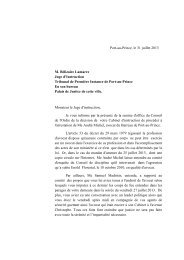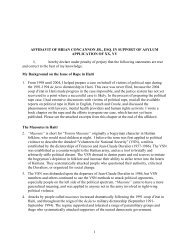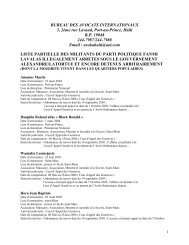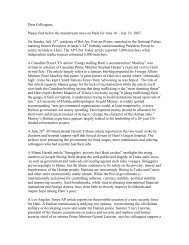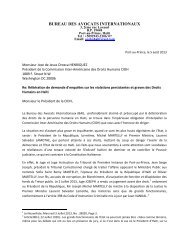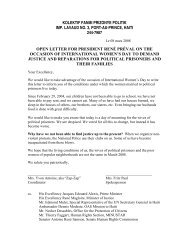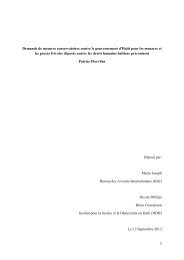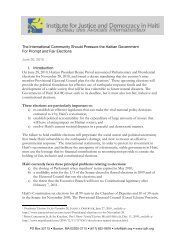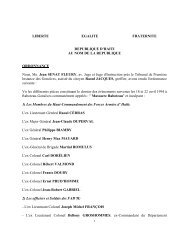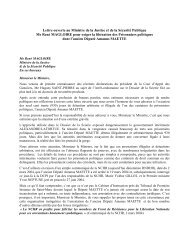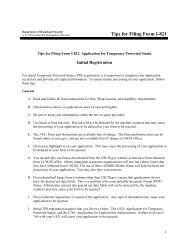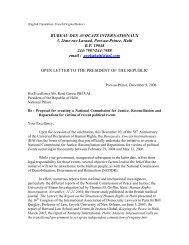Peacekeeping without Accountability - Yale Law School
Peacekeeping without Accountability - Yale Law School
Peacekeeping without Accountability - Yale Law School
- No tags were found...
You also want an ePaper? Increase the reach of your titles
YUMPU automatically turns print PDFs into web optimized ePapers that Google loves.
(CTCs). By November 2010, just a month after thefirst cases of cholera appeared in Haiti, MSF hadset up 20 CTCs; by early December, 20 more CTCshad been built. CTCs providing oral rehydrationsolution, the primary course of treatment forcholera, were also created in all of the regionsaffected by the disease. MSF set aside some 3,300beds in its facilities for cholera treatment, and bymid-December 2010, the organization had providedcare for more than 62,000 people. 76 MSF’s abilityto provide cholera treatment, however, was soonoverwhelmed by the volume of cholera cases as theoutbreak proved worse than originally anticipated.The treatment plan in the immediateaftermath of the outbreak focused on preventionof cholera infection and death. Local healthauthorities disseminated prevention informationto inhabitants of the rural areas near Mirebalaisand the Artibonite Delta where the first casesappeared. The prevention materials advised boilingor chlorinating drinking water and buryinghuman waste in the hope of stemming the spreadof cholera and avoiding further contaminationof water sources. Due to the rapid spread of thedisease and the high initial case fatality rate, MSPPand the U.S. government focused on five immediatepriorities: preventing deaths in treatment facilitiesby distributing supplies and providing training;preventing deaths in communities by supplyingoral rehydration solution sachets to homes andurging sick individuals to seek immediate care;preventing disease spread by promoting properhygiene and sewage disposal; conducting fieldinvestigations and guiding prevention strategies;and establishing a national cholera surveillancesystem to monitor the spread of the disease. 77Some training of field workers by internationaland bilateral organizations, including the U.S.Centers for Disease Control (CDC), contributed tothe treatment of effected populations during thefirst months of the epidemic. However, neitherthe MSPP nor international NGOs were able tocompletely contain the outbreak.outbreak. The mere task of providing treatmentsupplies has proven daunting as people in Haiticontinue to contract cholera. Difficulties inproviding treatment at the onset of the epidemicwere exacerbated by the fact that only one actor—the Program on Essential Medicine and Supplies,overseen by MSPP and the Pan-American HealthOrganization (PAHO)—distributed all donatedhealth care materials.Several medical organizations continue toprovide prevention and treatment for cholera inpartnership with the MSPP, but the initial fundingfor such work is nearly exhausted. Many aid groupshave already withdrawn from the country due toa lack of funding, and emergency cholera fundingfrom the CDC and World Bank is expected todecrease next year. 78In November 2012, the U.N. announced a $2.27billion initiative to eliminate cholera in Haiti andthe Dominican Republic in the next ten years. 79 Ajoint initiative among the WHO, PAHO, the CDC,and MSPP, the plan is comprehensive; it addresseswater and sanitation, waste disposal, integration ofcholera diagnosis and treatment into basic medicalscreening practices, and provision of choleravaccinations to high-risk groups. However, theU.N. has yet to secure all but a small fraction of thefunding necessary to complete the project fromU.N. member states. 80 To date, the U.N. has onlycommitted to supplying $23.5 million, less than 1%of the necessary funding.Both the short-term and long-term plans forresponding to cholera in Haiti have been criticizedas unrealistically optimistic. International NGOslike MSF struggle to provide quality care as theirbasic treatment supplies dwindle. The mortalityrate in some CTCs has recently risen to analarming 4% as a result of diminishing supplies. 81Although the plan to eliminate cholera in Haitimay be well-conceived in the abstract, it is of littlepractical value <strong>without</strong> proper funding.2. Long-term ResponseThe long-term effort to treat cholera and eliminatethe disease from Haiti has been less effectivethan the short-term response following the initial15 minustah and the cholera outbreak in haiti



